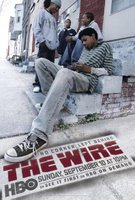 I’d only seen half of Alien Resurrection before buying the Quadrilogy, and it certainly wasn’t one of my reasons for doing so. What I had seen was fairly silly and spectacularly gory, even compared to the other instalments, and I’d heard nothing but bad things. But I checked it out over the weekend out of curiosity, if only so I’d know the context of another fascinating doco from this set.
I’d only seen half of Alien Resurrection before buying the Quadrilogy, and it certainly wasn’t one of my reasons for doing so. What I had seen was fairly silly and spectacularly gory, even compared to the other instalments, and I’d heard nothing but bad things. But I checked it out over the weekend out of curiosity, if only so I’d know the context of another fascinating doco from this set.Resurrection is pretty damn bad. Although it features numerous aliens and a more colourful supporting cast, this doesn’t compensate for failing, as Alien 3 did, to engage with the franchise’s core plot and ideas. Resurrection takes things in a completely different and ultimately silly direction. Granted, it had the unenviable task of bringing Ripley back from the dead, which inevitably affects the course and tone of the film, but Resurrection ultimately has nothing to say. Its major innovation is to bring Ripley and the aliens closer together following the cloning process, but to what end? Sure, after three films it would be tough to know what to do with the character, but when this reconciliation results in an alien-human hybrid that looks like a refugee from Pumpkinhead and is born to a cocooned Brad Dourif cooing “what a beautiful baby”, it’s sullied somewhat.
Resurrection sadly strays so far from the goals and sensibilities of the first two films – even more than the third – that its validity within the series is virtually nil. Sure, these films can function as superior sci-fi thrillers, but when the first two did such comprehensive jobs with this creature and ethos, an underlying engagement with character and theme is necessary in order to justify the existence of another go-around. Resurrection features scant characterisation, with the only hint of a meaningful relationship (between Ripley and Winona Ryder’s android Call) barely explored. The theme of a manipulative institution emerges again, but this one isn’t the Company of the first three films now that 200 years have passed, thus preventing any conclusive engagement with the plotline. It could be done thematically instead of literally via a confrontation with the arrogance of humanity that this new institution embodies, but Resurrection fails to do even that since the aliens kill everyone off before she would even have a chance.
The fault partly lies in Joss Whedon’s script, although he has since disowned the film having loathed how director Jean-Pierre Jeunet (Amelie) interpreted his work (he has said, perhaps too simplistically, that “it was mostly a matter of [them] doing everything wrong”). Perhaps the earlier drafts were stronger; Whedon wanted to give the film a purpose by finally bringing us, and the aliens, to Earth, but its presence in the script was whittled away by executives down to the unsatisfying ending where Ripley and the survivors breach the atmosphere… and then the credits roll. This would be appropriate if Earth had been established thus far as a redemptive or at least hopeful destination for Ripley, where she could finally find some peace, or perhaps justice. But instead, Earth is merely referred to as “a shithole”, and no confrontation takes place on it to at least offer us a new perspective on the aliens through the response of a residential community. The only semblance of a new angle is the Newborn, a laughably bad creation who serves very little function in the story other than as a new alien adversary. After establishing Ripley’s difficulties adjusting to a resurrected existence and her new alien side, the climax merely involves eliminating all alien threats before reaching Earth. Ripley and the others are afterthoughts.
Darius Khondji’s signature cinematography for Jeunet offers some treats though, with his standard extreme close-ups and other claustrophobic techniques, and his shooting of the underwater sequence, where the characters are pursued by aliens while trying to reach air, is thrilling and by far the best set piece in the film. The art direction is again terrific, and Jeunet sensibly looked to Ridley Scott’s original for inspiration. But it’s when comparing this film to that achievement that its shortcomings are evident. The series has degraded from the terrifying majesty of that initial instalment, with Resurrection failing to offer a new interpretation that also successfully integrates with the Alien concept, which would justify such a divergence.
We’ve yet to see a great third Alien film, but the time has almost certainly passed – it would be a matter of returning to a dried-up well. Hollywood certainly has no problem with that at the moment, of course, and the announcement that production has begun on Alien vs Predator 2 demonstrates how exactly Fox will be treating this franchise. If we had to have something though, I’m sure we’d all appreciate a sincere Alien film rather than such cash-ins. At least we had a couple of great ones, and a couple of well-intentioned stabs at the mythology.











